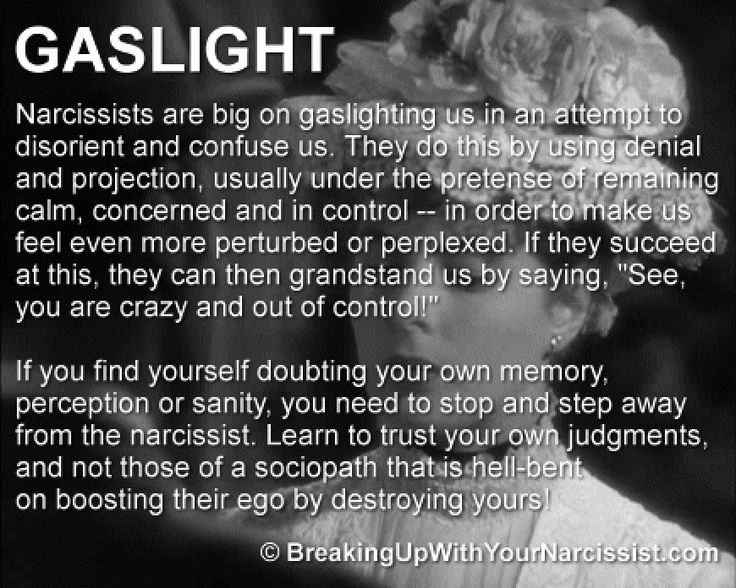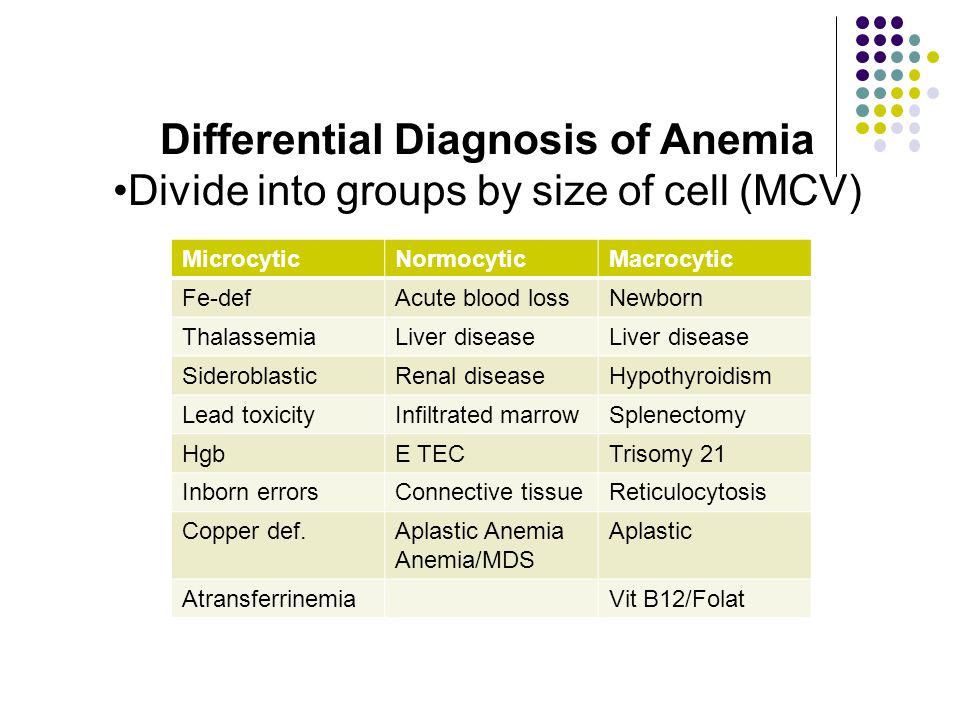Gaslighting relationship examples
16 Things Abusers Will Say
- Gaslighting happens when an abuser tries to control a victim by twisting their sense of reality.
- An example of gaslighting would be a partner doing something abusive and then denying it happened.
- Gaslighting can occur in romantic, platonic, and family relationships — or even at work.
Gaslighting is a type of emotional abuse that can happen to anyone, especially in romantic relationships.
Abusers gaslight their victims in order to maintain control in the relationship, and make their victim question their own sanity.
In the news: Merriam-Webster, the US dictionary publisher, announced that its 2022 word of the year is "gaslighting" due to the tremendous growth in the word's popularity. Compared to previous years, searches for the word's definition on Merriam-Webster's website increased 1,740% in 2022.
Additionally, the effects of gaslighting may make it even harder for the victim to leave an abusive relationship as they may not even realize it's happening.
Here are 16 examples of common gaslighting situations to help you recognize and address this very real form of emotional abuse.
Gaslighting examples in relationships
Marriam-Webster defines gaslighting as: "The act or practice of grossly misleading someone, especially for one's own advantage."
Gaslighting can happen in any situation including in a doctor's office, the workplace, and perhaps most notoriously in romantic relationships.
Below are 16 examples of what gaslighters say to manipulate you to help you recognize what's happening so you can respond the right way.
1. "That never happened."
Gaslighting often causes the victim to doubt themselves. Someone will do or say something abusive and then deny that it ever happened, says psychotherapist and licensed marriage and family therapist Tina B. Tessina, PhD, in private practice.
"The victim starts questioning [their] instincts and relies more and more on the 'reality' that gets created and manipulated by the abuser. It also heightens a sense of dependency on the abuser," says Tessina.
It also heightens a sense of dependency on the abuser," says Tessina.
2. "You're crazy — and other people think so, too."
On top of making victims experience doubt, gaslighters may even make their victim question their own sanity, Tessina says.
The gaslighter might also try to convince the victim's family and friends that they're mentally unstable so that they can further discredit any claims the victim is making.
"This decreases the likelihood that the victim's stories will be believed and disconnects them from the resources that would make it possible for them to leave [an abusive relationship]," says Tessina.
This is particularly common in male-female romantic relationships where the man is gaslighting the woman. According to a 2019 paper, this may be due to the way society can sometimes depict women as more irrational and less in control of their emotions than men.
3. "I'm sorry you think that I hurt you."
While this statement might seem like an apology, it isn't.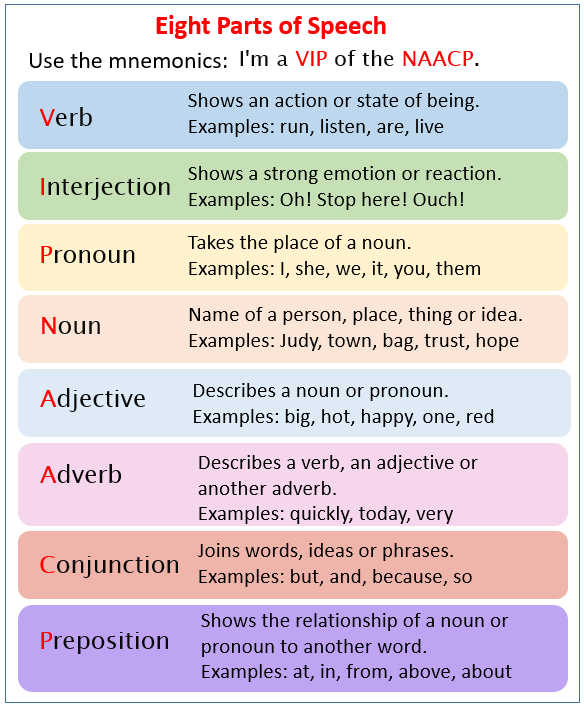 Instead, Tessina says this is a way for an abuser to deflect responsibility and blame the victim.
Instead, Tessina says this is a way for an abuser to deflect responsibility and blame the victim.
This kind of apology leaves the victim questioning their own judgment and wondering if they really did overreact. It can lead to the victim relying on the abuser's interpretation of events.
4. "Do you really think I'd make that up?"
An abuser most often will use this phrase when they are accused of lying or fabricating details.
This is another example that an abuser will use to make a victim question their reality. In using this phrase, abusers are manipulating the victim's understanding of trust. They are attempting to make the victim feel guilty for not trusting them. When victims hear this phrase, they will doubt whether the abuser is actually lying, questioning their own understanding of the truth.
5. "You're just trying to confuse me. You aren't making any sense."
This phrase is used to shift blame away from an abuser and onto a victim. Its purpose is two-fold: on one hand, the victim might feel foolish and unable to articulate how they are actually feeling.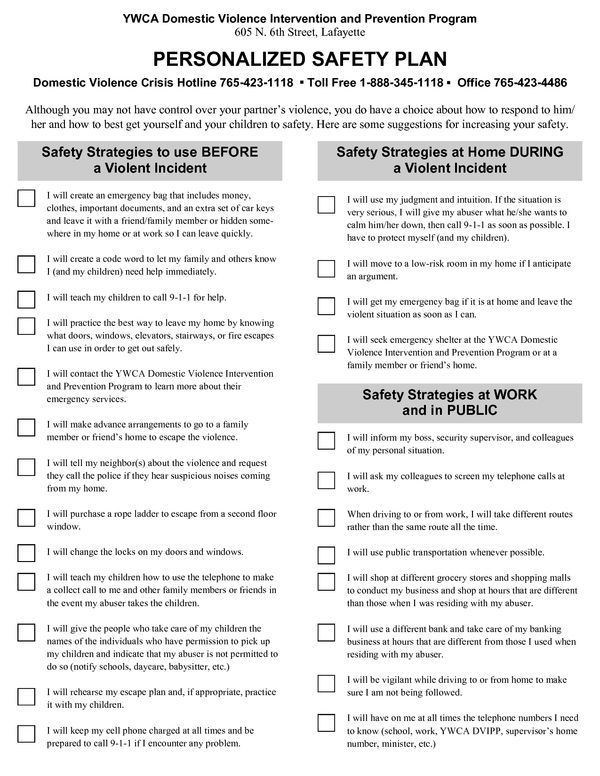 On the other hand, they could feel guilty, questioning their own intentions.
On the other hand, they could feel guilty, questioning their own intentions.
Using this method of gaslighting, the abuser is attempting to make the victim seem like "the bad guy" in the interaction.
6. "You know I'd never intentionally hurt you."
This phrase is another example of an abuser manipulating their victim's understanding of trust. By making themselves out to be pure in intention, they alleviate themselves of any guilt. At the same time, the abuser covers their bases for future offenses.
When a victim hears that their abuser would not intentionally hurt them, they question the validity of their emotions and if they have the right to be upset with their partner.
7. "I did that because I love you."
This phrase is an extremely common example of gaslighting in romantic and familial relationships. By justifying their intentions as loving, abusers manipulate victims into thinking that the abuser has their best interests at heart.
Therefore, victims will question their natural, negative reactions to abuse.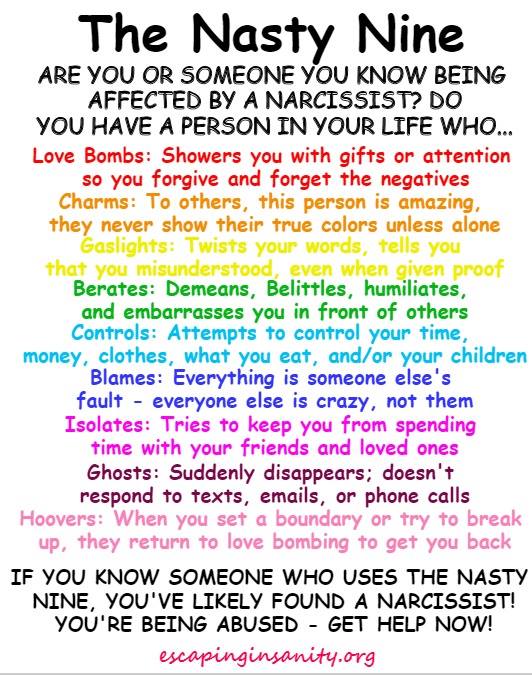 Because they believe the abuser is acting with love, the victim may feel guilty for feeling angry, afraid, or upset with the abuser.
Because they believe the abuser is acting with love, the victim may feel guilty for feeling angry, afraid, or upset with the abuser.
Gaslighting examples with family
Gaslighting can also occur in a family context, between parent and child, or siblings.
8. "You're too sensitive."
This is a phrase used by gaslighters to minimize and invalidate the victim's feelings.
If the victim tries to express hurt or disappointment, the gaslighter may tell them that they are making a big deal out of nothing. When parents say this to their children, the child will likely feel guilty or foolish for bringing their emotions into the conversation.
"The intent is to make you feel stupid for even trying to stand up for yourself. Once an abusive partner has broken down the victim's ability to trust their own perceptions, the victim is more likely to put up with the abusive behavior and stay in the relationship," says Tessina.
9. "You should have known how I would react.
 "
"This is another way an abuser will deflect responsibility onto the victim. This can make the victim feel guilty or hurt about a situation where they really didn't do anything wrong.
When a parent says this to their child, they're putting responsibility on the child for the outcome of the situation, making the child feel as though their actions caused a negative reaction.
"Gaslighting involves twisting facts so they can avoid personal ownership of their behaviors. By telling the victim they should have known better, the gaslighter places the blame on the victim for not only speaking up but also the abuser's response," says Tessina.
10. "That's just nonsense you read on the internet. It's not real."
This phrase is another example of diminishing or minimizing feelings. It is another phrase meant to make the victim question their reality and can make them feel stupid or incompetent. It also undermines the validity of information found on the internet, a useful tool for seeking community during difficulty.
When older children are confused about new emotions they're feeling, they might turn to the internet for information and comfort. When this information is undermined, they question not only what they're feeling but the source that gave them comfort.
Thus, this phrase can also isolate the victim: they may no longer turn to outside resources for information, causing increased dependency on their abuser.
11. "It's not that bad. Other people have it much worse."
When this phrase is used by abusers, it makes victims feel guilty for the natural emotions that crop up surrounding challenging situations.
This example is difficult to recognize as gaslighting because it seems as though the abuser is empathetic toward human suffering. It also may seem like they are attempting to comfort the victim by putting their pain into perspective. However, it undermines the victim's personal emotions and invalidates the challenges they are facing.
12. "You don't really feel that way.
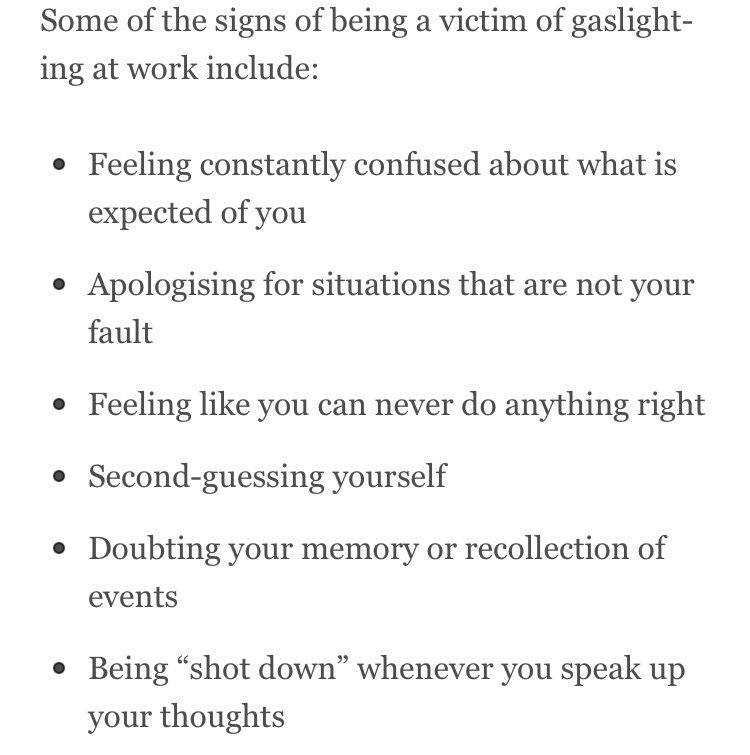 "
"This phrase is another example used by abusers to stifle a victim's emotions. This phrase is dismissive and meant to make the victim question whether what they are feeling is valid or normal.
When parents say this to a child who may not understand their full range of emotions, the child is likely to recognize their natural feelings as somehow wrong. They might later repress those feelings, causing self-doubt down the line.
13. "I'm worried about you. You keep forgetting things."
This phrase is another example of using feigned concern to undermine a person's reality. By acting concerned about the victim's memory, the abuser seems like they're acting in the victim's best interest.
This phrase not only undermines the victim's reality, but it also cements the abuser as a trusted person in the victim's life. Because they show concern for the victim's memory, the victim may feel the abuser is a good person who wouldn't hurt them.
Gaslighting examples at work
Gaslighting can also occur in a workplace, between a manager and employee, or colleagues.
14. "You have a terrible memory."
This is a common phrase gaslighters use to make victims doubt themselves. Of course, everybody experiences trouble with recalling certain details, but Tessina says gaslighters will make their victim doubt their memory as a whole, spanning a multitude of situations.
In a work environment, abusers might say this to undermine a coworker's work performance, causing them to doubt themselves and potentially embarrassing them in front of other coworkers.
"They do this because getting a victim to question themselves is at the core of gaslighting. When a victim no longer trusts their assessments, the abuser is in complete control," says Tessina.
15. "I emailed you about the meeting. Are you sure you didn't get it?"
This phrase and sentiments similar to this one is meant to shift blame away from the abuser and onto the victim. In this situation, the abuser likely forgot to email the victim or intentionally left them off the email thread in order to undermine their work performance.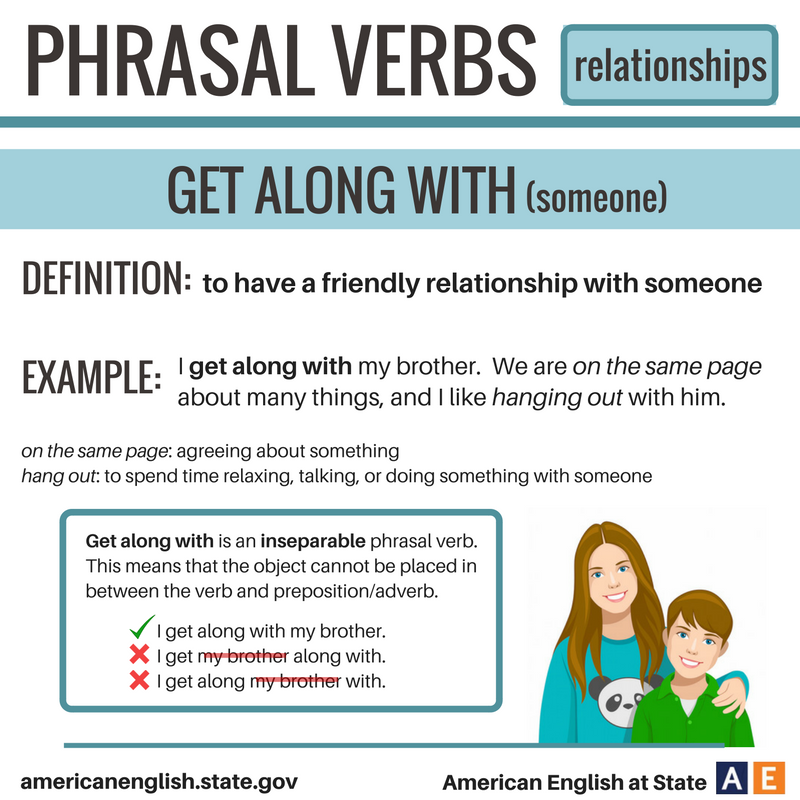
Shifting the blame onto the victim is meant to make them question their understanding of reality, as well as feel personal blame, guilt, and incompetence about their ability to do their job.
16. "You seem stressed. Not everyone can handle new responsibilities."
This example of gaslighting is tricky to recognize, as it is masked in concern for the victim. By feigning concern for the victim's stress level, the abuser gains the victim's trust. However, they are also slighting the victim, making them feel uniquely incompetent for being unable to handle a heavy workload.
When an abuser says this to a victim, the victim will feel like they are personally flawed or somehow "not good enough" to perform the task they've been assigned. This lack of self- confidence can further affect work performance, adding even more stress to the victim's plate.
How to get help
Leaving an abusive relationship — or mending a work or family relationship — isn't a journey you have to undertake on your own. Therapists and trauma-informed counselors are supportive resources for leaving unsafe situations and rebuilding confidence and self-love.
Therapists and trauma-informed counselors are supportive resources for leaving unsafe situations and rebuilding confidence and self-love.
Seeking help from a local therapist or an online therapy collective such as BetterHelp, Talkspace, or Cerebral is an effective way to process emotions around gaslighting.
Additionally, community resources like support groups can be helpful in eliminating isolation and feelings of invalidity and loneliness. These support groups can connect you with other survivors in similar situations, reminding you that you're not alone in your experiences.
Insider's takeaway
If you believe you're the victim of gaslighting, there is hope. You do not have to stay in an unhealthy and abusive relationship.
Remember: It's not your fault that you're in an abusive relationship, and it's possible for you to leave. Recognize the signs of gaslighting and open up to friends, family, or a professional to get help.
Ashley Laderer
Ashley Laderer is a freelance writer from New York who specializes in health and wellness.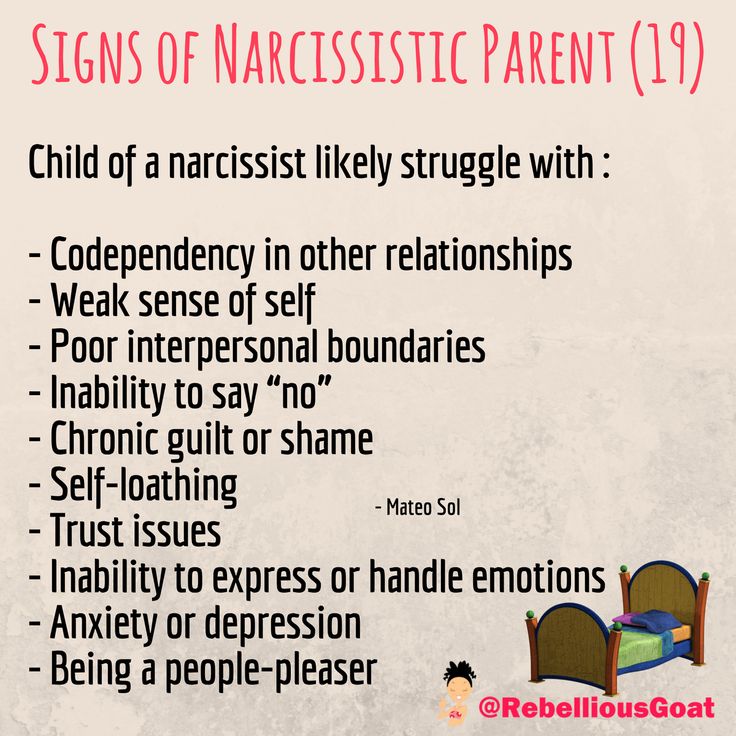 Follow her on Twitter @ashladerer
Follow her on Twitter @ashladerer
Read moreRead less
We may receive a commission when you buy through our links, but our reporting and recommendations are always independent and objective.
What Is Gaslighting in a Relationship?
You're probably heard the word "gaslighting" before, but do you know what it actually means? Simply put, "gaslighting" is a manipulative tactic used to shift the power dynamic in a healthy relationship so that one person has complete control over the other. To gain insight into the psychology behind this toxic relationship dynamic, we asked psychotherapist Jeremy Bergen, MS, LCPC, to weigh in.
What Is Gaslighting?
Gaslighting is a form of sustained psychological manipulation that causes the victim to question or doubt their sanity, judgment, and memories.
"At its heart, gaslighting is emotional abuse," explains Bergen. "It's a tactic one partner uses in an effort to exert power over, gain control over, and inflict emotional damage on the other.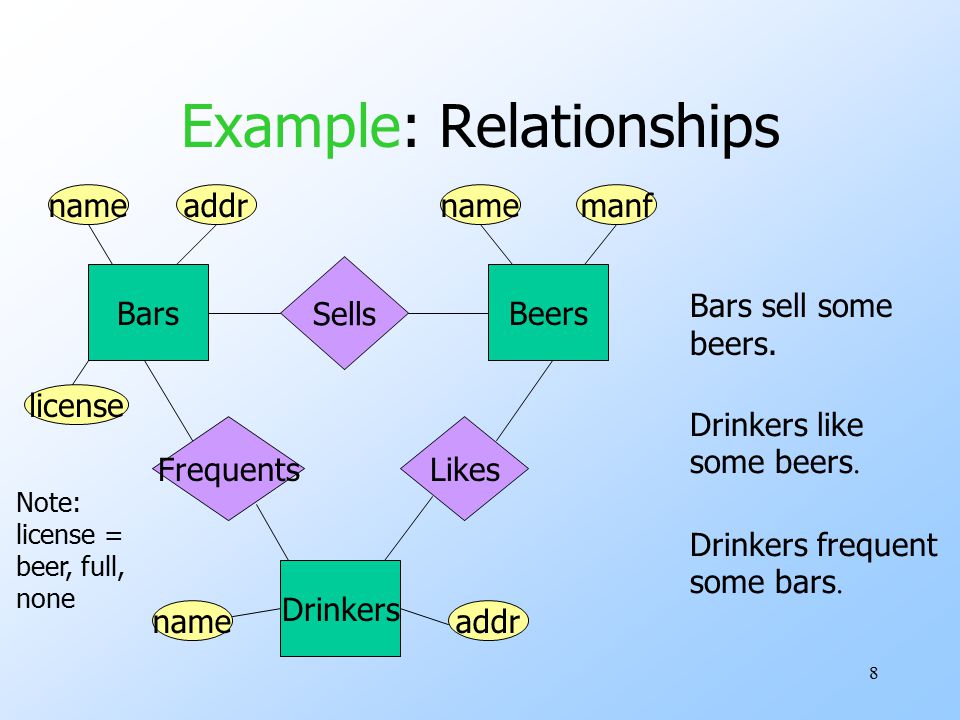 " According to Bergen, "Gaslighting is such a malicious form of emotional abuse because it causes you to question your experiences, so it can be difficult to identify the warning signs."
" According to Bergen, "Gaslighting is such a malicious form of emotional abuse because it causes you to question your experiences, so it can be difficult to identify the warning signs."
Meet the Expert
Jeremy Bergen, MS, LCPC, is a Chicago-based psychotherapist specializing in individual, family, and couples counseling. He is the founder of Bergen Counseling Center.
Ahead, Bergen breaks down the psychology behind gaslighting in relationships, including identifying the warning signs, understanding the reasoning behind this venomous behavior, and navigating the next steps.
Signs You're Being Gaslighted
They Make You Question Your Perception of Reality
The major warning sign of gaslighting is that "your partner challenges your perception of situations, of yourself, of your thoughts, of your feelings, of their behavior," explains Bergen. "One of the big warning signs is this persistent sense that what you saw, you didn't really see. And what you experienced, you didn't really experience.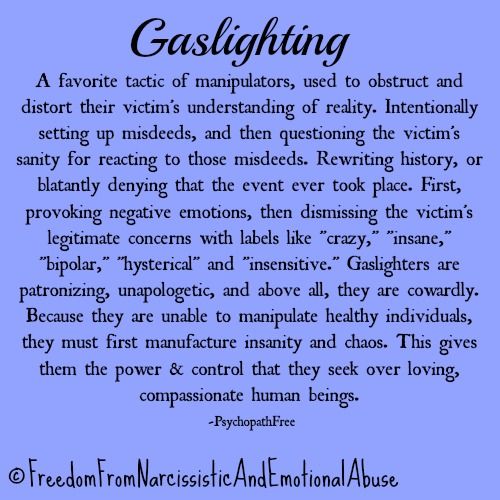 What you felt, you didn't really feel."
What you felt, you didn't really feel."
They Persistently and Blatantly Lie to You
According to Bergen, "Their lies are designed to be manipulative for control." If you think your partner may be gaslighting you, Bergen suggests asking yourself questions such as Does my partner consistently make me question my thoughts and experience of things? Do I catch them in lies?
They Make You Feel Insecure by Breaking You Down
In order to gain control and power, a gaslighter will harp on the gaslighted's insecurities. To help determine if your partner is breaking you down, Bergen suggests asking yourself, Is this person saying things that are designed to make me feel bad? Is the level of criticism pervasive in that sense of they're going at the same thing consistently?
They Try to Alienate You From People Who Care About You
"They do this because they want to control the narrative," Bergen explains. "They want to separate these relationships, so they'll cause conflict.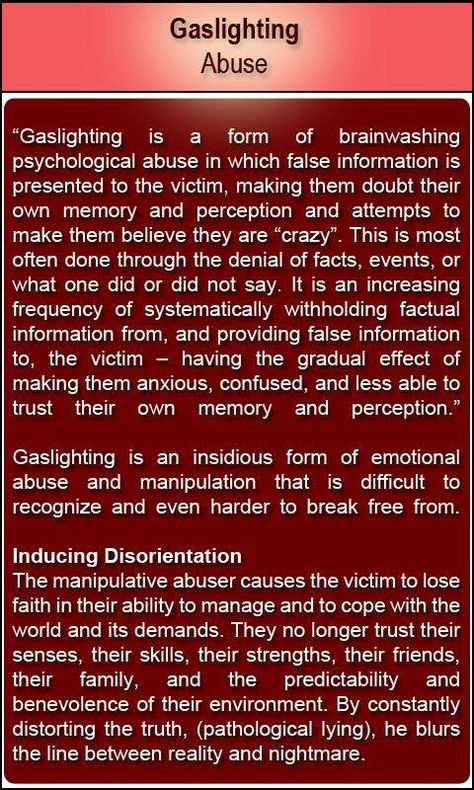 "
"
They Lie About Saying Something When You Have Proof
Gaslighting is all about making the victim question their reality and sanity. Often, a gaslighter will deny saying or doing something and treat the victim as if they are crazy. Sometimes referred to as "countering," the gaslighter will question the victim's memory of an event, will deny it ever happened, or will pretend to forget what actually happened, even if you have proof. They'll either discount or twist the reality of your evidence.
Examples of Gaslighting in Relationships
Use of "Love" as a Defense
If someone says, "You know I only do it because I love you," or, "Believe me, this is for the best," when doing something you perceive as abusive, controlling, or wrong, they are probably gaslighting you. Gaslighters might use love as a defense for their actions and suggest that you don't love them equally if you don't agree with what they say or do. For example, the gaslighter might sabotage opportunities (jobs, friendships) for you in order to control you, then justify it by saying they were concerned or that they did it because they care about you.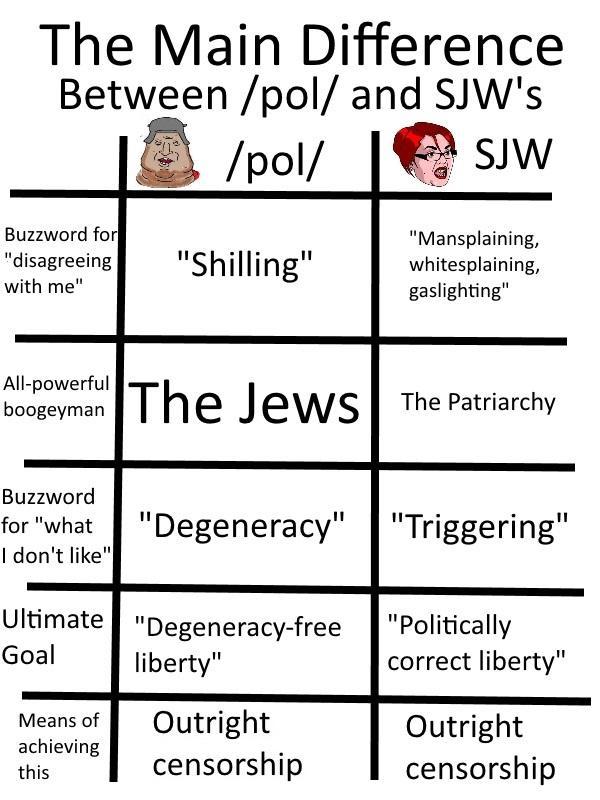
Accusations of Paranoia
One of the most common tactics of gaslighters is accusing their victim of paranoia. This often happens when a romantic partner is cheating. Gaslighters will deflect the problem onto their partner instead of taking responsibility for their own bad behavior. They'll say things like, "You really think I would cheat on you? You're just insecure," or, "Why are you so paranoid? You know I would never do that." The gaslighter will accuse the victim of being overly sensitive and jealous in hopes that they will no longer trust their instincts or observations.
Constant Criticism or Disparagement
A gaslighter may use verbal abuse to wear their victim down in an attempt to keep them stuck in the relationship. They may use constant insults or comments like, "You know you'll never get anyone better than me," or, "You're terrible with money. That's why I have to control the finances." They want to make you believe you're unlovable or useless without them and therefore must stay in the relationship.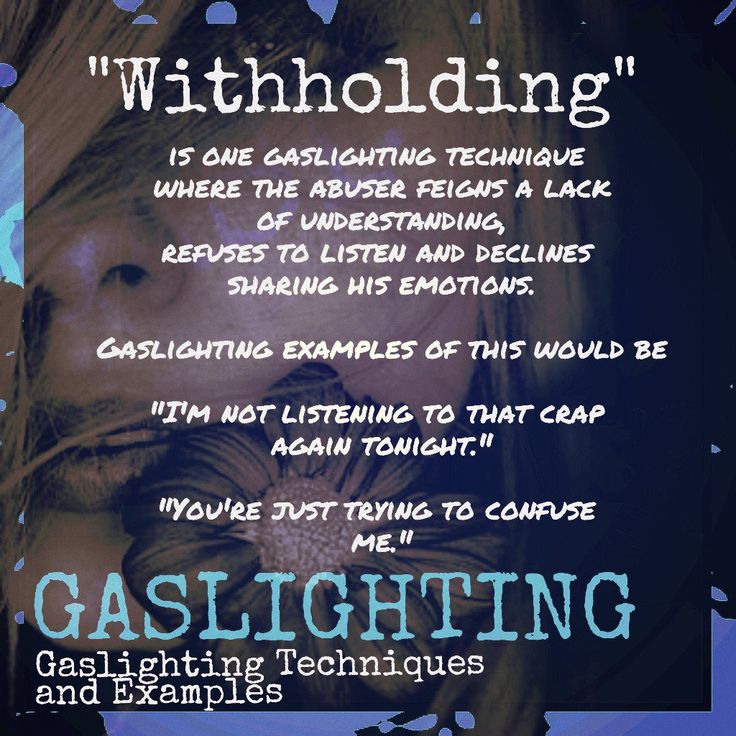 Other insults, like calling you "dramatic," "hysterical," "ungrateful," or "crazy" are meant to make you question your sanity.
Other insults, like calling you "dramatic," "hysterical," "ungrateful," or "crazy" are meant to make you question your sanity.
Why Gaslighting Happens
People seek power and control in relationships for a wide variety of reasons, so the rationalizations for gaslighting vary from case to case. However, there are a few patterns, Bergen shares.
They Believe It's the Only Way to Sustain the Relationship
"In some cases, gaslighting is a way to try to keep somebody who you want to be in a relationship with around in a very abusive way—there's this notion that this is the only way to sustain the relationship," says Bergen.
They Feel Better About Themselves When Controlling Someone Else
"Sometimes, there's a genuine sense of, 'If I'm controlling other people, then I feel better about where I'm at,' and that search for power is something that expresses itself in the relationship," explains Bergen.
They Just Enjoy the Power and Control
According to Bergen, there's "a decent amount of research that shows there are people who genuinely find pleasure in having control over others. "
"
What to Do If They're Gaslighting You
The first step in recovering from gaslighting is to commit to breaking the cycle of abuse. Don't allow your plans to be derailed by your abuser, who will likely ramp up his or her manipulations upon recognizing your intent to escape the relationship. Prepare yourself for this, and likewise aim to stay one step ahead in the pattern so that you're able to remain as disassociated as possible. Here are some additional tips that may help:
Seek Help From Someone Outside the Relationship
Turn to a friend, family member, or trusted coworker to validate your feelings. This won't be easy, as a byproduct of gaslighting is the feeling of isolation; the victim has been manipulated to believe that their abuser is the only one who truly understands them. Realize that this isn't the case, and seek out a confidant who can help you assess the situation, corroborate your memories, and/or confirm that something's not right.
It's not advised to talk to your partner about feeling like you're being gaslit because they'll likely tell you that what you're seeing isn't what you're actually seeing.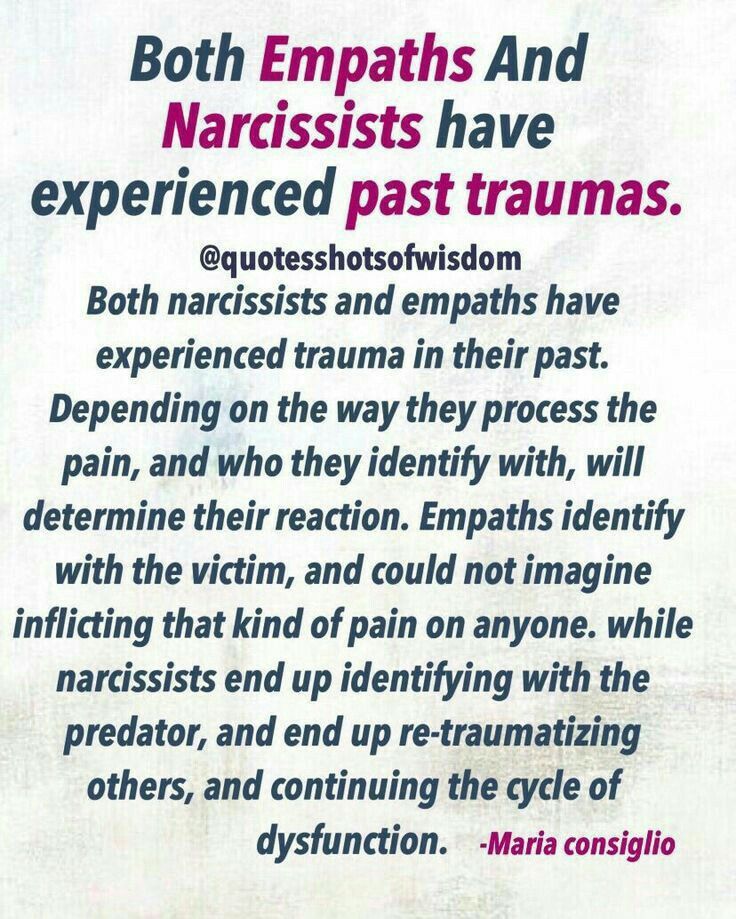 They want to maintain control in the power dynamic.
They want to maintain control in the power dynamic.
Approach Your Recovery Like a Marathon, Not a Sprint
While speaking with a loved one is therapeutic, you might need the counsel of an impartial third party (think psychologist or therapist) to not only guide you out of the smoke and mirrors but to help ensure you don't slip back into the cycle of abuse, no matter the nature of the relationship in question—romantic, familial, platonic, professional, or otherwise.
Considering couples' therapy with your partner? Go for it, but be sure to book your own, private sessions, too. And remember: Long-term, regular therapy with a qualified professional might be necessary to equip you with the tools needed to break free from (or at least distance yourself from) a toxic or one-sided relationship. After all, building a sturdy bridge between your past missteps and your future successes is unlikely to happen in a single session.
Focus on Yourself
Do not lose your sense of self. This, coupled with the aftershocks of a breakup (even if the split is from a family member or a friend), can create the perfect conditions for wallowing. Still, it's important to ditch your couch-and-sweatpants habit before it becomes routine. "Create space internally, mentally, emotionally, and then externally by engaging with people outside the relationship," advises Bergen. Direct some much-needed attention to any relationships that may have been on the back burner, and open yourself up to meeting new people, too. A shared interest is always a great ice-breaker, so think about signing up for a workshop, class, retreat, or another opportunity to combine a pastime with socialization.
This, coupled with the aftershocks of a breakup (even if the split is from a family member or a friend), can create the perfect conditions for wallowing. Still, it's important to ditch your couch-and-sweatpants habit before it becomes routine. "Create space internally, mentally, emotionally, and then externally by engaging with people outside the relationship," advises Bergen. Direct some much-needed attention to any relationships that may have been on the back burner, and open yourself up to meeting new people, too. A shared interest is always a great ice-breaker, so think about signing up for a workshop, class, retreat, or another opportunity to combine a pastime with socialization.
Get out of your rut—and reclaim your identity—by partaking in activities that you love or once loved. Go for a hike, scribble in a journal, cook up some comfort food—whatever it takes to make you feel whole again.
Trust Your Gut
Now and always, resolve to heed your intuition and follow your instincts.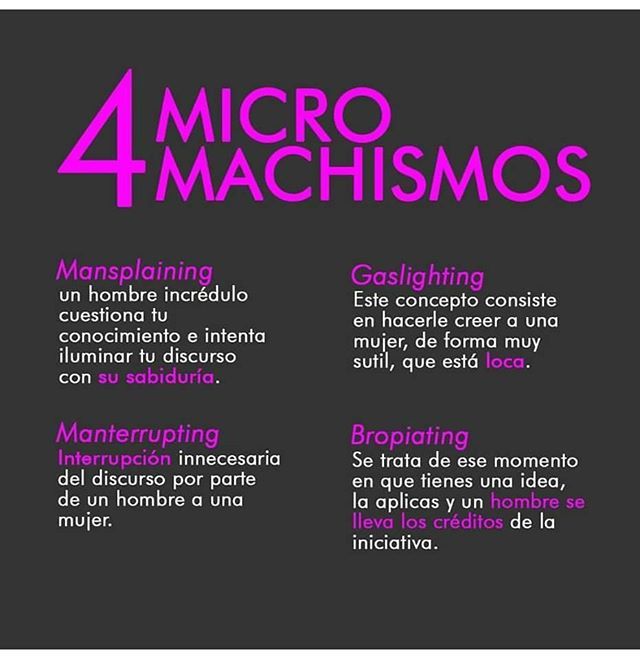 "The internal step, in terms of what to do if you feel like you're being gaslit, is to make the commitment to yourself that you do not have to question your thoughts, feelings, perceptions about anything," advises Bergen. "That is a choice that you make as an individual to reassess a situation that nobody is allowed to re-narrate anything for you." In other words, your emotions, thoughts, and memories should never be subject to debate—period.
"The internal step, in terms of what to do if you feel like you're being gaslit, is to make the commitment to yourself that you do not have to question your thoughts, feelings, perceptions about anything," advises Bergen. "That is a choice that you make as an individual to reassess a situation that nobody is allowed to re-narrate anything for you." In other words, your emotions, thoughts, and memories should never be subject to debate—period.
What Is Breadcrumbing? A Relationship Expert Explains
Gaslighting - what it is, signs, examples, how to resist
Many things that seem to be harmless can cause serious damage to the psyche. Unsolicited advice to lose weight or constant doubts about your sense of humor can be gaslighting. Clinical psychologist Aliya Sabirzyanova explains in simple terms what it is, what are the signs and types of gaslighting and how to deal with it
Gaslighting is a form of psychological abuse. One person, manipulating another, intimidates him, makes him doubt his own abilities, the adequacy of his judgments, and even his memories. The term owes its origin to Patrick Hamilton's play Gaslight ("Gas light", hence the concept of gaslighting) and its film adaptation 1944 years with Ingrid Bergman. The woman she plays is manipulated by her husband, the first ever gaslighter. He rearranges objects, turns on gas lighting so that the light in his wife's room begins to fade. The man insistently claims that all this only seems to his wife. All this is necessary so that he can convince her that she is insane and rob Bergman's heroine with impunity.
One person, manipulating another, intimidates him, makes him doubt his own abilities, the adequacy of his judgments, and even his memories. The term owes its origin to Patrick Hamilton's play Gaslight ("Gas light", hence the concept of gaslighting) and its film adaptation 1944 years with Ingrid Bergman. The woman she plays is manipulated by her husband, the first ever gaslighter. He rearranges objects, turns on gas lighting so that the light in his wife's room begins to fade. The man insistently claims that all this only seems to his wife. All this is necessary so that he can convince her that she is insane and rob Bergman's heroine with impunity.
Gaslighting as a form of violence includes both isolating the victim and regularly instilling guilt in her, but the methods here are much more sophisticated. Everything is based on a subtle individual psychological approach, in which the balance and confidence of the victim are gradually shaken, and the abuser takes almost complete control, dictating his will to her. nine0005
nine0005
Why gaslighting is dangerous
Most often, the victim of gaslighting ceases to trust himself, his sensations and feelings. A person loses the ability to check with himself, rely on beliefs. As soon as a person loses this support and loses touch with reality, he becomes very suggestible and can be convinced of anything, even that he is insane. The victim becomes completely emotionally dependent on the gaslighter - his moods, opinions, behavior.
Related material nine0005
The longer the gaslighting lasts, the more the victim feels that something is wrong with him, all his feelings are deceitful or wrong. At the same time, she will stubbornly deny the influence of the gaslighter. The mental health consequences can be devastating, ranging from increased anxiety, reduced self-esteem to clinical depression.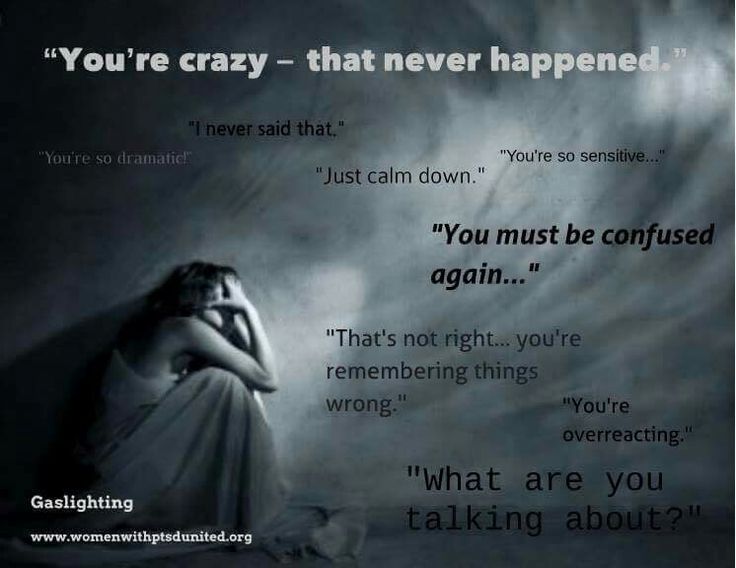 Particular attention should be paid to the fact that gaslighting can be a provoking factor in the development of certain diseases or disorders - such as schizophrenia, OCD, depersonalization and derealization (of course, if there is a predisposition to them). nine0005
Particular attention should be paid to the fact that gaslighting can be a provoking factor in the development of certain diseases or disorders - such as schizophrenia, OCD, depersonalization and derealization (of course, if there is a predisposition to them). nine0005
How to understand that you are being gaslighted
First, a person develops uncertainty in actions and thoughts. The victim will doubt everything: in his adequacy, in the decision already made, in the feeling whether she is a good person (mother, wife, employee), whether she is doing the right thing. Secondly, the feeling that the partner’s opinion is the only true one becomes an alarming signal. Only he alone and no one else knows what is right.
Victims have a constant internal tension: everything seems to be in order on the outside, but something is not right. This tension practically does not go away, but only grows and becomes unbearable. This is exacerbated by the fact that the person's social circle is rapidly shrinking, because the victim is embarrassed, ashamed, or has to lie and keep back when asked about a partner. In such isolation, gaslighting the victim becomes even easier. nine0005
This tension practically does not go away, but only grows and becomes unbearable. This is exacerbated by the fact that the person's social circle is rapidly shrinking, because the victim is embarrassed, ashamed, or has to lie and keep back when asked about a partner. In such isolation, gaslighting the victim becomes even easier. nine0005
The victim begins to believe that the gaslighter really cares about them and wants only the best.
According to the research of psychoanalyst Robin Stern, any victim of gaslighting goes through three stages.
- At first, she notices oddities in the behavior of the abuser, but does not want to devalue her relationship, thinks that this is a minor incident that will not happen again, and does not attach any importance to it.
- She then begins to doubt herself and her own perception — but tries to confront the gaslighter, to convince him,
- Third stage - the victim believes the abuser is right.
 She understands that she is wrong or even to blame for what is happening. She can no longer distinguish his manipulation from real concern, trying to adapt to his requests so that he approves of her behavior. The main goal is to meet his expectations.
She understands that she is wrong or even to blame for what is happening. She can no longer distinguish his manipulation from real concern, trying to adapt to his requests so that he approves of her behavior. The main goal is to meet his expectations.
What Tactics Manipulators Use
A gaslighter has many different tactics that he uses methodically, but they all have one goal in common - to use psychology to change the perception of the victim in any way. We can list the most common examples of gaslighting in life. nine0005
- Denial: “You're making this up, it never happened. I couldn't say that." These are the most common statements made by gaslighters in a confident and peremptory tone. It is they who make the victim question his memory over and over again.
- Devaluation of emotions: “In reality, you don’t feel so bad”, “Your reaction is inadequate”, “And you want to say that you don’t feel guilty?” Depreciation and deliberate suggestion of "false" feelings leads to the fact that the victim ceases to understand what she really feels, what her true emotions are, does not trust her feelings.
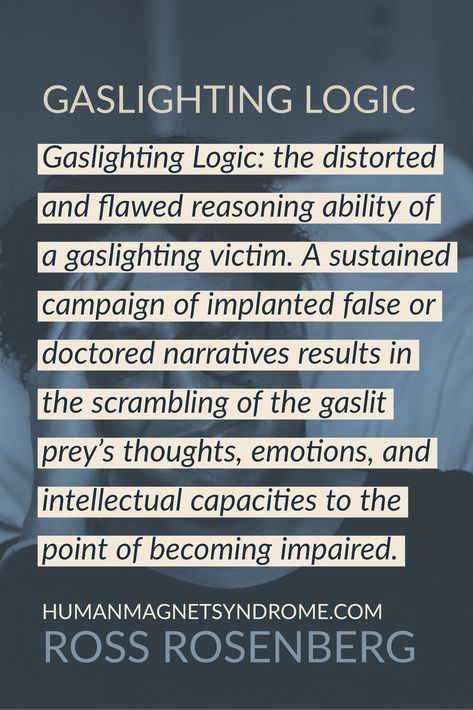 nine0030
nine0030
- Assurances of inadequacy: "You dreamed", "You dreamed again!", "Something is wrong with you the last few days!", "It seems to me that you are not yourself." Such pressure provokes doubt, guilt and helplessness in the victim, which only increases its dependence.
- Shifting responsibility. “It's your fault (a)”, “You forced me (a)”, “It's all because of your intemperance!”. The gaslighter won't admit he's manipulating. On the contrary, he will declare that he was forced to do this with her. As a result, the victim begins to justify the gaslighter and sincerely believe that she deserves everything that happens to her. nine0030
- Toxic sayings and jokes: "Who else will tell you the truth?", "Believe me, I'm saying this because I love you." Usually such phrases are followed by statements, the purpose of which is to injure and offend the victim.
 This leads to the fact that the victim begins to believe that the gaslighter really cares about her and wants only the best, in parallel, there is an addiction to constant humiliation.
This leads to the fact that the victim begins to believe that the gaslighter really cares about her and wants only the best, in parallel, there is an addiction to constant humiliation.
Because of the closeness that partnerships entail, the gaslighter usually has a free hand
There are also several types of gaslighting: in relationships, at home, at work, and among friends. All of them have their own characteristics and typical examples.
Couple gaslighting
Because of the closeness that partnerships entail, the gaslighter is usually completely free to work. He can combine all of the above tactics, further isolating the second partner from family and friends, like a spider weaving a web from which it will be difficult to get out.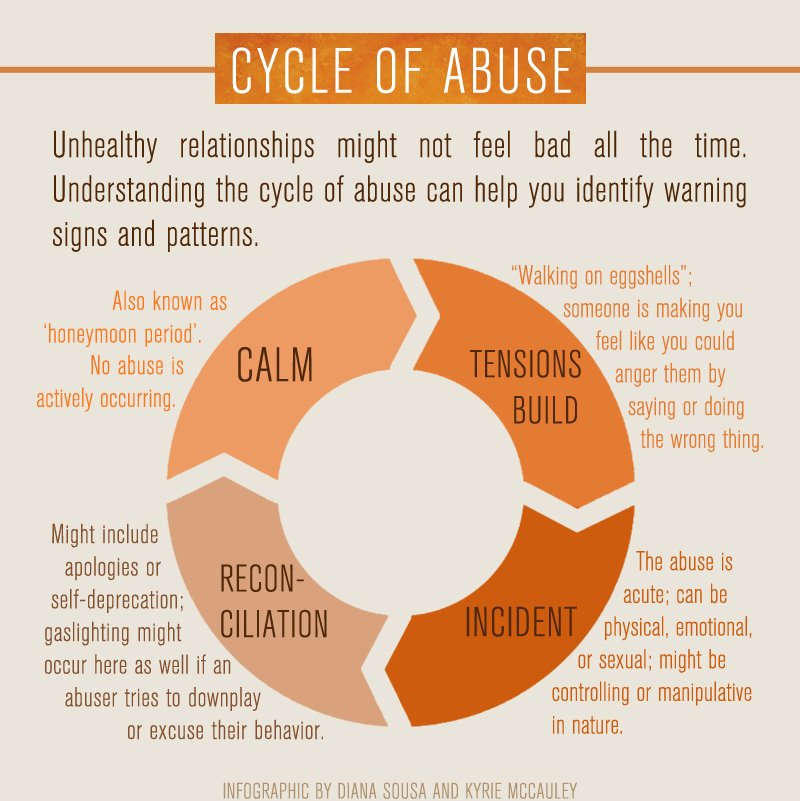
For example: a gaslighter husband, in order to maintain control over his wife, regularly emphasizes that she forgets everything and never remembers promises. So he makes her feel guilty and gradually makes her doubt that she is able to remember something correctly. Now he can force her to do what she was not ready for: to introduce experiments into her sex life. The wife, on the one hand, is convinced that she really wanted to do just that, and on the other, the inner feeling that something is wrong will continue to corrode her. nine0005
Gaslighting in Friendships and Family
Common gaslighting tactics in friendships are toxic language, denial and devaluation of emotions. The same can be said about relationships with parents when they refuse to understand the feelings of an already grown child or dismiss the experiences of a teenager.
For example: a friend (or even a mother), in order to steadily increase her own self-esteem and satisfy her need for power, regularly shows concern for someone else’s weight: “No one will tell you, because they don’t care about you, but I must say: you improved a lot. I do not offend you, but I tell the truth, because I love you and care about you. nine0005
Related material
Gaslighting at work
The most common tactics in this case are denial, belief in inadequacy and shifting responsibility.
For example: a leader who does not accept the thought that he may be wrong gives you a specific assignment. You carry it out, but his idea is not accepted by the management. He publicly says that he did not entrust you with anything, you yourself came up with this task and in general where your head was when you did it.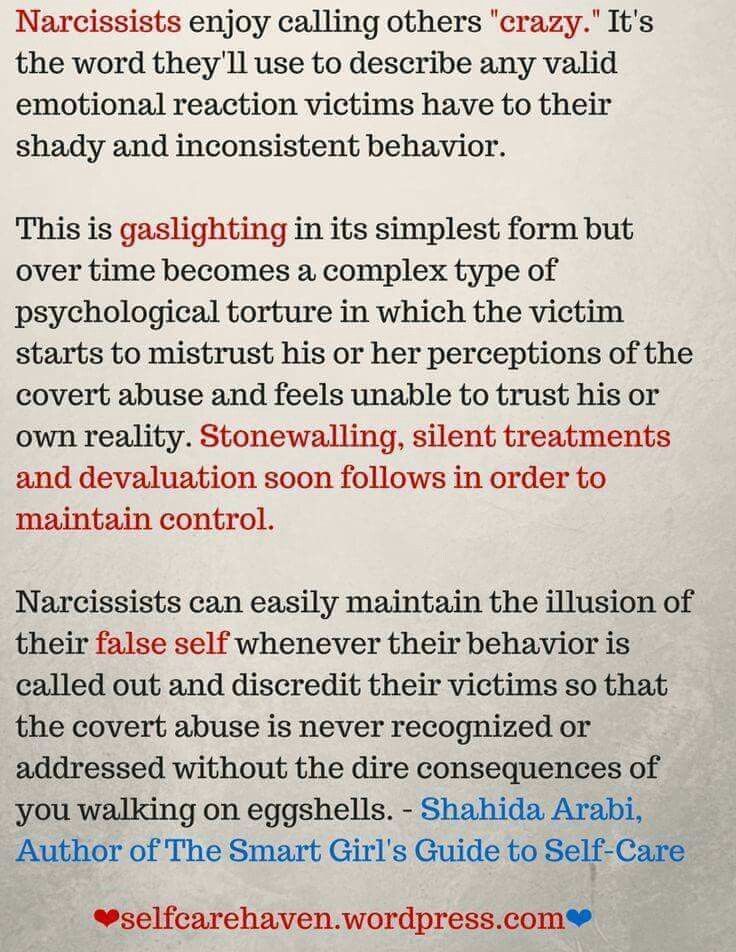 nine0005
nine0005
How to deal with gaslighting
The first and most important step is to detect gaslighting in a relationship. The easiest way to do this is at the first or second stage, it is much more difficult at the third, when the victim is already completely dependent on the manipulator and the fight against him seems unrealistic. In any case, the way out of such a relationship will be to restore confidence in yourself, so all recommendations will be based on this.
- Trust your own feelings
You will have to gradually get rid of the influence of the gaslighter. Start with bodily sensations. Even the mere assurance that you are really cold or hot will slowly begin to give you back the ability to understand what you really want and think. nine0005
nine0005
- Be aware of physical and emotional boundaries
Notice what is unacceptable to you, how you should not be treated. Try to use your boundaries as a point of stability. Try to give up more often what is unpleasant for you and does not suit you. Stand your ground.
- Expand your social circle
Reach out to people you knew before the gaslighter. Find out how they see you personally from the outside, if you have changed, how they see your relationship and your partner. Try to get a different opinion, proof that you adequately perceive reality. nine0005
- Seek professional help
Some of the consequences of gaslighting – anxiety, fear, depression – will be difficult to cope on your own, in this case, qualified psychological help will help not only cope with them, but also allow you to rely on yourself and your strength again.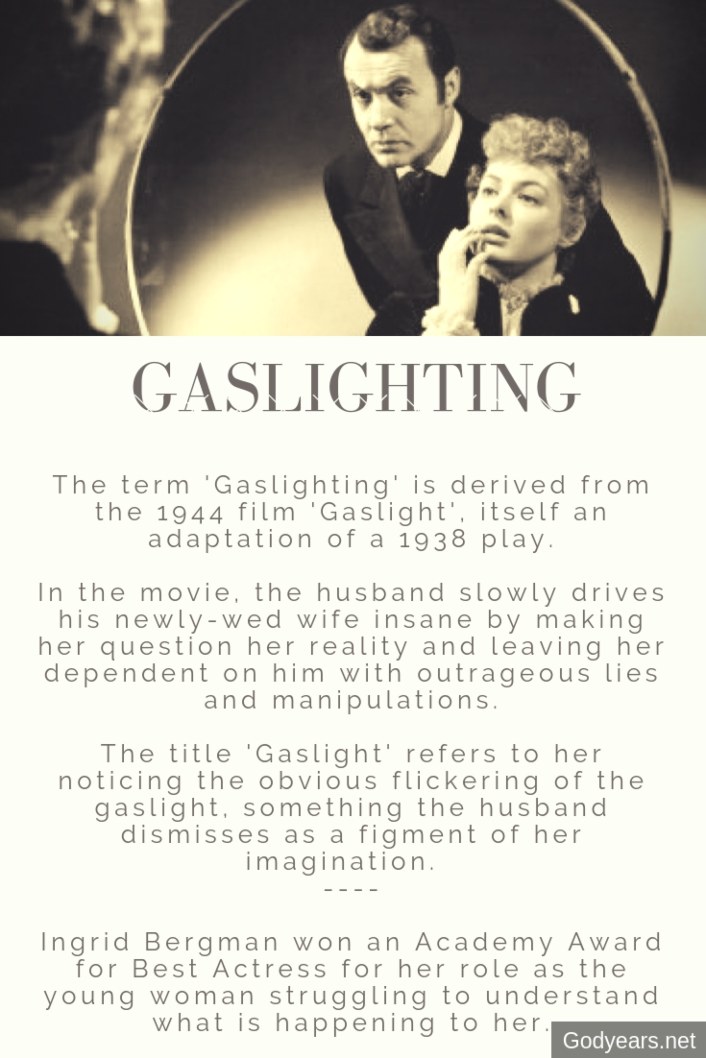 I would like to address the same advice first of all to people who suspect that they themselves are behaving incorrectly.
I would like to address the same advice first of all to people who suspect that they themselves are behaving incorrectly.
If you suspect a gaslighter in your relationship, the best thing you can do is see a professional. A professional can help you figure out if this is the case, understand what caused the behavior, what important needs you are meeting through gaslighting, and help you practice nonviolent communication skills. nine0005
What is gaslighting: signs and methods of struggle
Typical phrases of gaslighters: “I didn't say that”, “You're confusing something”, “It's just a joke”, “You're too sensitive”. If you often hear this in your address, we advise you to beware. Gaslighting can take on many different dimensions, and most importantly, it is much more common than it seems.
"Gaslighting" is the word of the year for 2022 according to Webster's American Dictionary. The compilers noted that the term is also often used in a political context.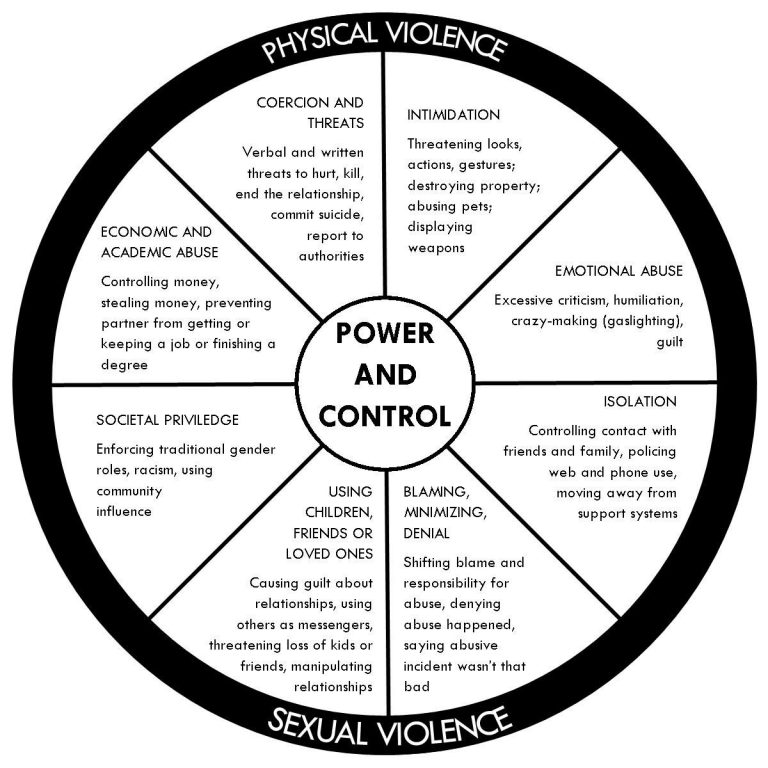 nine0005
nine0005
- What is gaslighting
- Signs of gaslighting
- Gaslighting Tactics
- Examples of gaslighting
- The dangers of gaslighting
- How to deal with gaslighting
- Psychological comments
Advertising on RBC www.adv.rbc.ru
What is gaslighting
Gaslighting is a form of psychological abuse in which the manipulator denies what happened, trying to make the victim doubt their own memories and change their perception of reality. nine0005
The gaslighter systematically devalues the words, experiences, deeds and successes of another person [1]. In the end, his victim begins to feel helpless and insecure. A person is increasingly thinking about his emotional stability and adequacy, while a gaslighter gets almost complete control in a relationship [2]. Such manipulation tactics are found everywhere - in a couple, in a family, at work, in a circle of friends. However, gaslighting may or may not be intentional.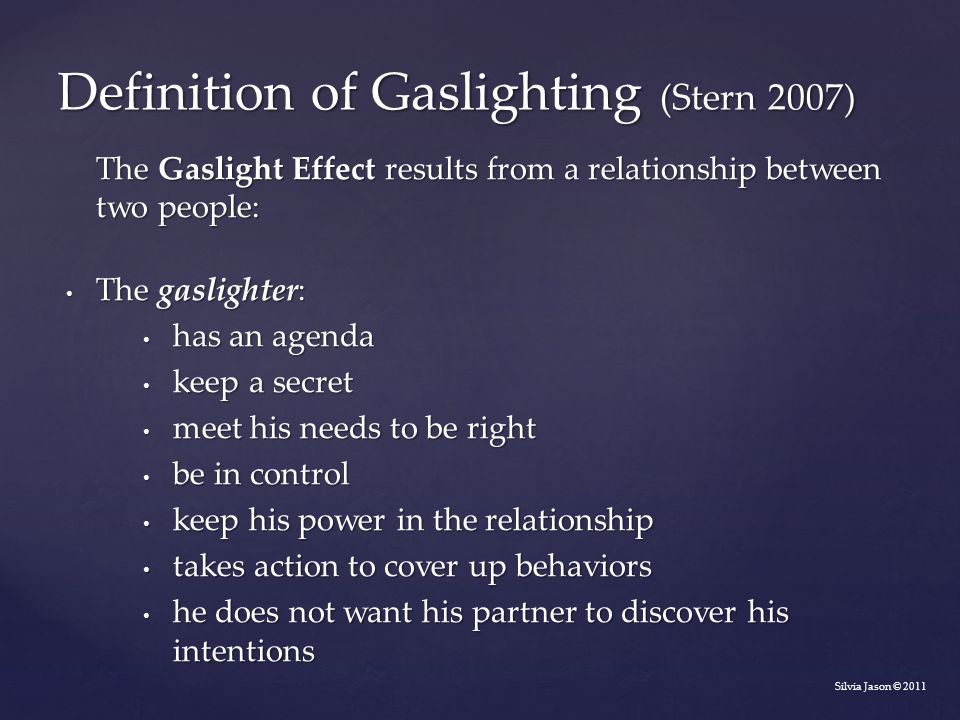 nine0005
nine0005
The term began to be used in the middle of the 20th century. It owes its appearance to George Cukor's 1944 film Gaslight. According to the plot, the insidious husband manipulates the mind of a young wife, forcing her to consider herself mentally ill. First, he convinces his beloved that she has no talent for singing, persuades her to leave her career and return to her hometown. And then he begins to arrange strange incidents, convincing the girl that nothing unusual is happening around. As it turns out, the hero does all this in order to take possession of the inheritance of his wife. nine0005
Still from the film "Gaslight"
© Metro-Goldwyn-Mayer
Signs of gaslighting
Gaslighting can be calculated by a number of characteristic signs. To do this, you need, first of all, to carefully listen to your own feelings. Here is a list of "symptoms" that may indicate that you are in a relationship with a manipulator:
- you think you are doing everything wrong;
- you push your desires into the background; nine0029 you feel anxious and insecure;
- you always blame yourself if something goes wrong;
- you have difficulty making even simple decisions;
- you suspect yourself of excessive sensitivity;
- you have stopped enjoying your favorite activities;
- you think that you used to be more confident and cheerful;
- you often apologize to your partner, parents, colleagues.
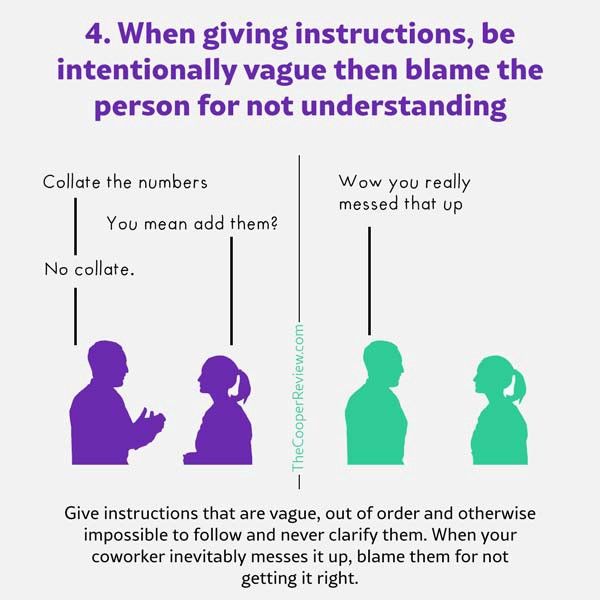
As a rule, psychological abuse occurs gradually and imperceptibly. A person being gaslighted usually goes through three stages. They are not always consistent and may overlap.
1. Denial
At this stage, the first signs of gaslighting appear. The victim notices unusual changes in the behavior of the gaslighter, but does not attach much importance to this. For example, he may say something offensive to you or deny previous actions. You are surprised by this, but still confident in your point of view. nine0005
2. Protection
A person begins to doubt himself and his perception of reality. He is increasingly criticized by the manipulator and feels frazzled, but continues to defend himself. You argue frantically with the gaslighter and are constantly looking for evidence to convince him of your case and win his approval.
3. Depression
The victim does not have the strength to fight and argue - she loses her "I". The person begins to believe the words of the gaslighter and agrees with all the accusations in order to gain his favor. He feels helpless, overwhelmed, disorganized. In the third stage, clinical depression and anxiety disorders may develop. nine0005
He feels helpless, overwhelmed, disorganized. In the third stage, clinical depression and anxiety disorders may develop. nine0005
© Soulful Pizza/Pexels
Gaslighting Tactics
The gaslighter uses a variety of tactics to mislead the victim and influence their perception of reality. It's about methodical brainwashing. As a result, after some time, the victim becomes emotionally dependent on the aggressor - his mood, opinion, behavior.
Here are six of the most common gaslighting strategies. Observe yourself and those close to you. You may be able to recognize yourself or someone you know as the victim or manipulator. nine0005
1. Denying the facts
Gaslighters love to rewrite history. To make a person doubt their own memory, they distort the facts and change the details of events. The manipulator may categorically deny having said or done anything, even if the evidence suggests otherwise.
Instead, he will accuse the victim of lying: “Why are you composing? This has never happened!” Gaslighters can be so convincing that people really start to believe their version of events. The situation is aggravated if a distracted and forgetful person becomes a victim. nine0005
The situation is aggravated if a distracted and forgetful person becomes a victim. nine0005
2. Bad jokes
The gaslighter is usually someone from a close circle. These are the people who have the greatest influence on us. They know about our vulnerabilities, weaknesses and experiences, which means that if they wish, they can easily use this knowledge to their detriment.
For example, gaslighters often make caustic and rude jokes about the victim, make inappropriate remarks, or give offensive nicknames. All this is disguised as friendly banter, when in fact the task of the manipulator is to hurt and humiliate. nine0005
3. Devaluation of emotions
Gaslighters often discount and ignore other people's feelings. If you are offended by his joke, be prepared to hear: “You are too sensitive! Don't make an elephant out of a fly." If you say that you feel bad, he will answer: “You thought of everything, it seems to you. Better do something useful."
The manipulator shifts the focus to their own experiences and needs, ignoring the state of mind of the victim. Over time, a person begins to believe that all his emotions and reactions are wrong, and ceases to trust his feelings. As a result, the gaslighter gains even more power. nine0005
Over time, a person begins to believe that all his emotions and reactions are wrong, and ceases to trust his feelings. As a result, the gaslighter gains even more power. nine0005
4. Emphasizing the inadequacy of perception
From time to time, each person needs to "check the clock" with other people. We are looking for evidence of the accuracy of our perception of reality and the adequacy of statements. The gaslighter, on the contrary, tries to convince the victim that her reaction to the events that are taking place is abnormal.
He can say: "You've been very strange lately", "You're reacting inappropriately", "Are you sure everything is all right?", "You obviously need help." All this leads to the appearance of doubt, guilt and helplessness in the victim. This is exactly the effect that the manipulator achieves. nine0005
5. Shifting Responsibility
Under no circumstances will the Gaslighter admit to being manipulated. Instead, he will look for the guilty around him and will always come up with an explanation for his actions - he was provoked, forced or framed.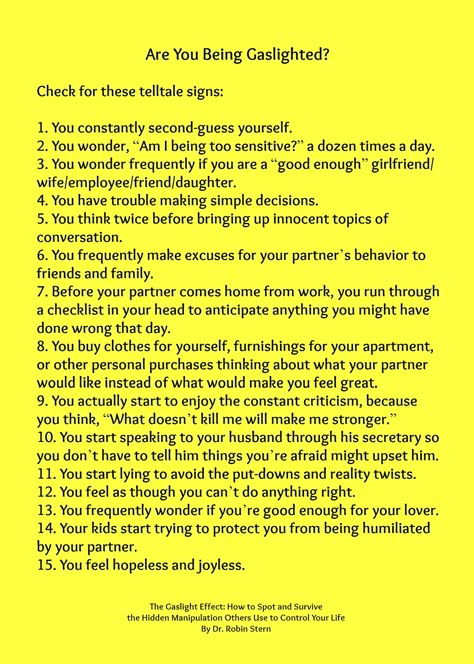 A typical example of a reaction is: “I didn't mean anything bad. You took me out."
A typical example of a reaction is: “I didn't mean anything bad. You took me out."
With this method of psychological abuse, the manipulator often projects his shortcomings onto others. He blames the victim for the behavior that is characteristic of himself. As a result, a person begins to make excuses and switches attention from the gaslighter to himself. nine0005
6. Aggression and Hostility
Gaslighter is always on the offensive. His favorite form of defense is attack. For example, if you suspect such a person of treason, he will accuse you of pathological jealousy, low self-esteem and self-doubt. And if you show him evidence, he will become aggressive.
In addition, the gaslighter tends to belittle the successes and achievements of his victim. Marker phrases: “At your age, I knew how to do this for a long time”, “Nothing special”, “Everyone can do it”, “And you try to do it faster / better”. His job is to make the victim feel inferior. nine0005
© Jure Siric/Pexels
Examples of Gaslighting
Gaslighters are not always easy to identify: they don't bruise and often masquerade as harmless humor, constructive criticism, or concern. It is easiest to understand this phenomenon with specific examples.
It is easiest to understand this phenomenon with specific examples.
Couple gaslighting
Example: a woman is sure that her husband is cheating on her. She notices long hair on his shirt, lipstick marks on his neck. The man is increasingly late at work and does not pick up the phone. At the same time, to her suspicions, he says: “You are paranoid! Instead of feeding me dinner, you ask stupid questions. See a psychologist and don't distract me from work!" nine0005
Bottom line: after some time, the woman loses the ability to accurately assess what is happening. She begins to doubt her conclusions, blames herself for being too suspicious, and finally apologizes to her husband for baseless accusations.
Gaslighting for children
Example: A boy gets an A in chemistry, a subject that he struggles with. After school, he hurries home to please his parents. He proudly shows the diary to his father, and in response he hears: “So what? What are you so happy about? Also a great achievement for me! At your age, I generally had only fives.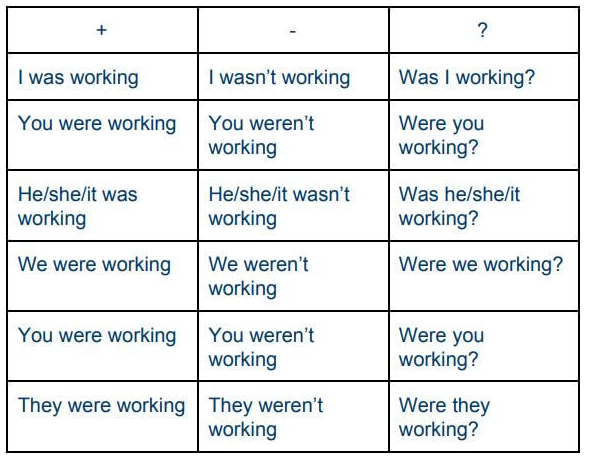 And you're not trying hard enough." nine0005
And you're not trying hard enough." nine0005
Bottom line: according to the father, this is how he stimulates his son's interest in learning and motivates him to strive for high results. In fact, the child ceases to trust his own emotions, becomes convinced of his insolvency and grows up insecure.
Gaslighting with friends
Example: One friend regularly criticizes another about her appearance, hobbies, interests, and tastes. “I’m only telling you all this because I love you,” the girl explains. In addition, she likes to make sharp jokes about her friend and tell her about what they say about her behind her back. Most often, these are offensive things. But sometimes you can hear a compliment from her. nine0005
Bottom line: girl's self-esteem drops, but she continues to communicate with a toxic friend, because she gives the appearance of caring. In addition, the gaslighter wants to isolate the insecure girl from other people in order to gain more control over her.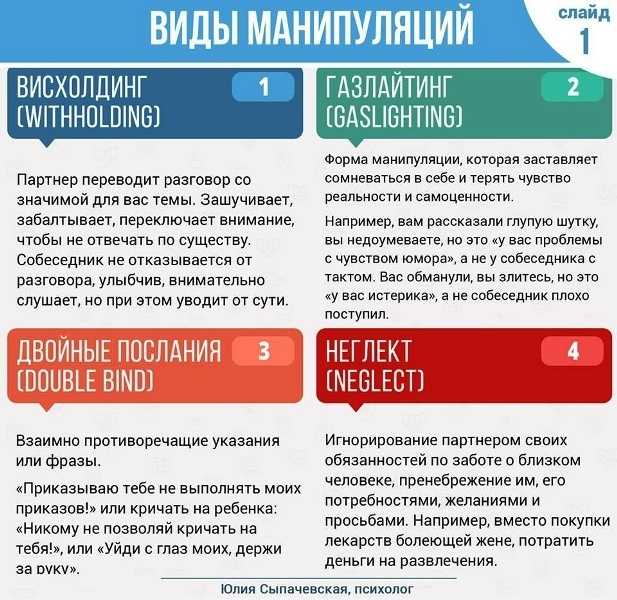 And her rare compliments are a way to confuse and keep on the hook.
And her rare compliments are a way to confuse and keep on the hook.
Gaslighting in the workplace
Example: A new employee receives an assignment from a manager. He writes down everything that needs to be done and gets to work. When the assignment is completed, the boss reprimands the subordinate in front of everyone. He claims to have asked for something else. The employee shows the notes, but the manager replies indignantly: “Are you kidding me? How could I give you such an order! Are you all right?" nine0005
Outcome: after a few remarks, the employee begins to believe that he misunderstands the words of the management. He gets confused, feels insecure in meetings, feels guilty, and is constantly under stress. As a result, its performance drops [3].
© Joanne Adela/Pexels
In addition, experts distinguish the following types of manipulation.
- Self-gaslighting: when a person denies and devalues their own feelings (“I always exaggerate everything”, “It’s a shame to be upset about this”, “I am too sensitive”).
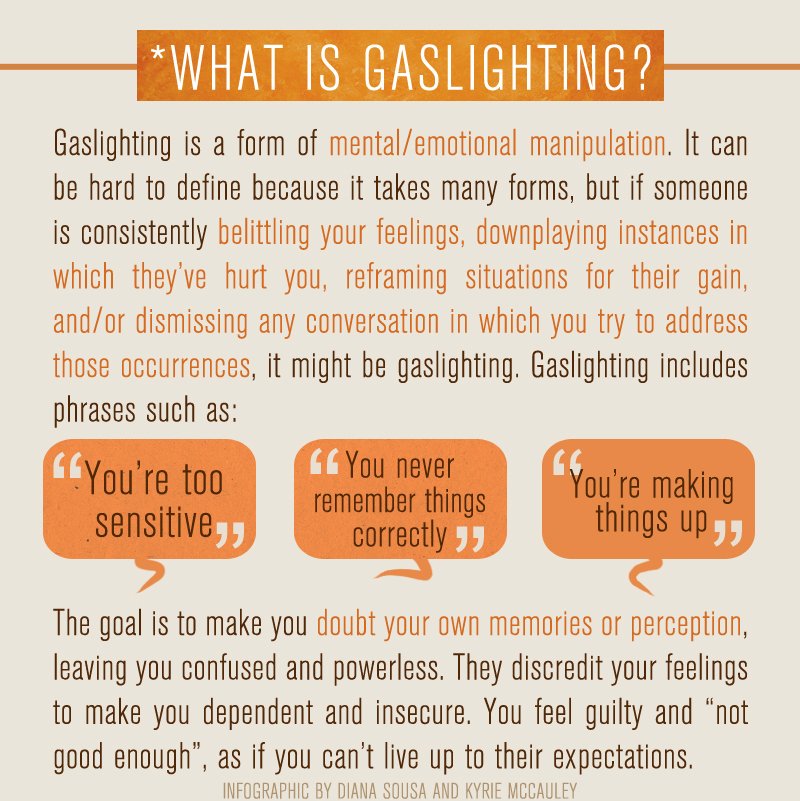 nine0030
nine0030 - Physician gaslighting: when a physician ignores a patient's complaints by mistakenly believing that their symptoms are the result of a psychosomatic disorder.
- Racial gaslighting: when gaslighting techniques are applied to a person because of their race or ethnicity.
- Political gaslighting: when politicians refer to the mental instability of opponents, distort facts or hide information in order to gain control over people. nine0030
Why gaslighting is dangerous
A person who has become a victim of gaslighting ceases to trust his feelings. Over time, due to the actions of the manipulator, he may seriously begin to think that he is suffering from a mental disorder. In addition, systematic gaslighting often leads to real psychological and emotional problems. Among them - increased anxiety, depression, post-traumatic stress disorder, the formation of codependency. All this makes it difficult for the victim to get out of the influence of the manipulator.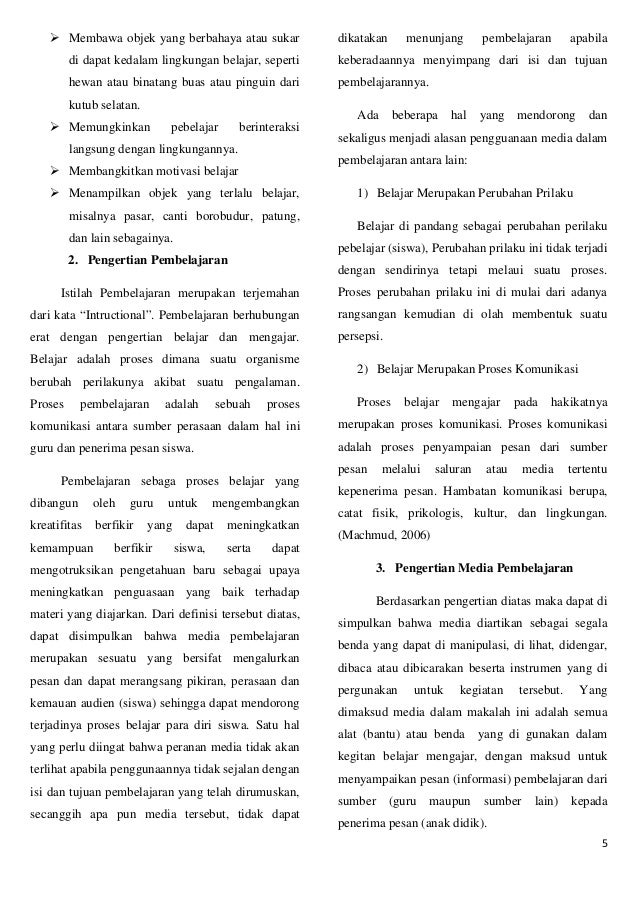 nine0005
nine0005
“Victims of gaslighting usually have very low self-esteem. It is difficult to have a good opinion of yourself when you are constantly being proved that this was not or cannot be felt, what you feel is all “nonsense” and “fiction”. Immediately you begin to feel somehow different, ”explains Anastasia Afanasyeva, a psychiatrist, psychotherapist, specialist in the Alter psychologist selection service.
Another important point: emotional abuse often develops into assault. So, if a person experienced gaslighting at the beginning of a relationship, they are more likely to experience physical abuse in the future. nine0005
Some experts suggest that gaslighting can cause schizophrenia. “Psychosis can potentially happen, but gaslighting is unlikely to be the main trigger for this. Most likely, the person already had a genetic predisposition. But to stop understanding and distinguishing your emotions, to lose confidence in your own memory, to start devaluing what is happening to you - these are the direct consequences of gaslighting, ”adds Anastasia Afanasyeva.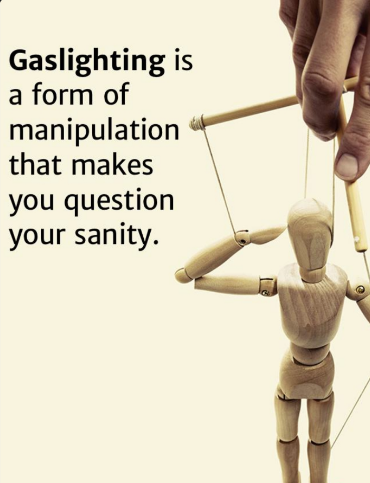
A vivid example of the devastating effect of gaslighting on a person is the Zersetzung technique. Its name can be translated from German as "biodegradation" or "decomposition". In the 1970s and 1980s, this method was actively used by members of the GDR secret services to fight the “internal enemy”. nine0005
They broke into dissidents' houses and made minor changes to the interior: they hung towels, rearranged papers, opened windows, changed dishes, or poured a different kind of tea into the kettle. At night, people were disturbed by strange calls, their cars were moved to other places, and passers-by on the streets often called them by other names.
Everything was done to undermine a person's faith in his own adequacy. Demoralized victims withdrew into themselves, stopped leaving the house, slowly went crazy. As a result, they not only stopped political activity, but sometimes took their own lives. nine0005
How to deal with gaslighting
Psychological pressure can last for years before the victim realizes what is happening.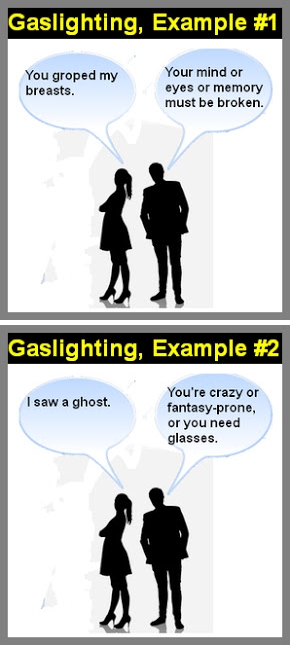 At the same time, relationships with a gaslighter are most often characterized as dependent or codependent, which means that it is especially difficult to get out of them. Here are some helpful tips to help you resist manipulative techniques.
At the same time, relationships with a gaslighter are most often characterized as dependent or codependent, which means that it is especially difficult to get out of them. Here are some helpful tips to help you resist manipulative techniques.
Trust your feelings
Listen to your feelings more often. If you're upset, then you are. Nobody has to convince you otherwise. Remember that you know yourself much better than anyone else, and your judgment of yourself is much more accurate than the opinion of a gaslighter. During disputes, do not try to convince the manipulator - it is pointless. Be firm: stick to your own version of events and facts. This way you can deal with uncertainty even if the gaslighter builds up the pressure. The main thing when communicating with him is a confident tone and a decisive attitude. But you can’t show the aggressor doubts and fears. nine0005
“In order to avoid gaslighting, it is important to be aware of your physical and emotional boundaries. That is, you need to understand what is personally acceptable to you and what is not. If a person is well versed in his emotions, knows what his life values are and what he aspires to, then it will be extremely difficult to devalue his words and question his perception of reality, ”explains Anastasia Afanasyeva.
That is, you need to understand what is personally acceptable to you and what is not. If a person is well versed in his emotions, knows what his life values are and what he aspires to, then it will be extremely difficult to devalue his words and question his perception of reality, ”explains Anastasia Afanasyeva.
Enlist the support of friends
Ask people you trust to look at the situation from the outside. Do you really have the problems that the gaslighter talks about all the time? Do they notice your "oddities"? In addition, experts advise recording events: keeping a personal diary, taking photographs, recording conversations on a voice recorder. Firstly, this way you will always have evidence at hand that can be presented at the right time. Secondly, it will allow you to double-check your own words and memories. If you are convinced that you are right, the gaslighter will not be able to control you. nine0005
“The challenge here is not to find the “right” solution, but to get a variety of opinions. Perhaps you will see that reality is not as unambiguous as it is presented to you. In addition, sometimes it is useful to sit down and write a story in the third person, as if watching yourself from the side. This exercise will help you understand more clearly whether something is really wrong with you or with another person,” advises Anastasia Afanasyeva.
Perhaps you will see that reality is not as unambiguous as it is presented to you. In addition, sometimes it is useful to sit down and write a story in the third person, as if watching yourself from the side. This exercise will help you understand more clearly whether something is really wrong with you or with another person,” advises Anastasia Afanasyeva.
© Ksenia Chernaya/Pexels
Don't let yourself be blamed
The next time a gaslighter starts to distort the facts and try to make you doubt your own adequacy, tell him directly that you are not ready to put up with his behavior. Let the manipulator know that you have figured out his tactics. Clearly define your boundaries and calmly explain that his words offend you and in the future you will not tolerate it. If all else fails and the manipulator continues to gaslight you, be prepared to minimize or completely stop communicating with him. The chances that the aggressor will change his behavior are reduced to zero.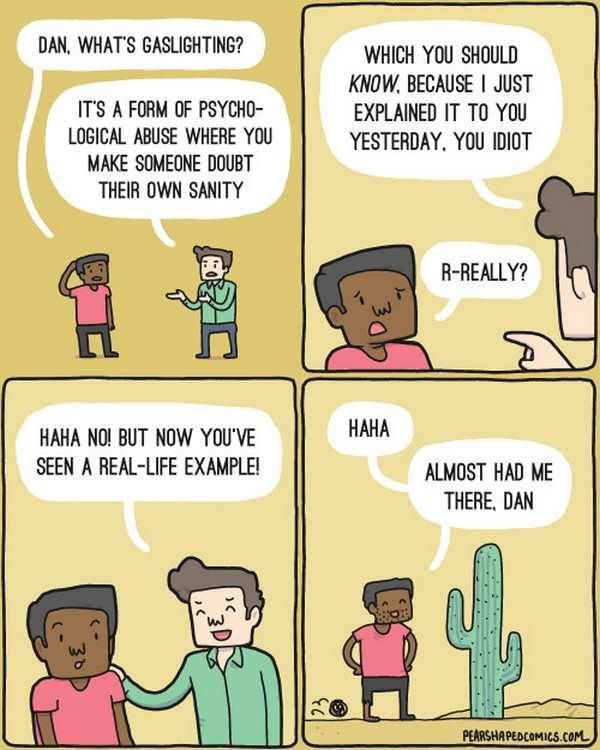 nine0005
nine0005
Seek help
Often the victim is manipulated just because it is important for her to stay in a relationship with the manipulator, and not break it off. For example, when it comes to gaslighting as a couple or between family members. In this case, you need to reconsider the tactics of your behavior and start following the new rules. It is best to seek help from a qualified professional. The longer a person is exposed to gaslighting, the more devastating the effects will be. A psychologist will help you cope with anxiety and fears, sort out your doubts and get out of the situation with the least losses. nine0005
Psychologist's comment
Anastasia Afanasyeva, psychiatrist, psychotherapist, Alter psychologist selection service, lecturer at the Institute of Organizational Psychology
Anyone can become a victim of gaslighting - it all depends on the influence and persuasiveness of the person or group of people who use such manipulations. But there are certain characteristics and personality traits that make people more likely to gaslight.
First, young age and low level of education. Children do not yet have abstract thinking. It is difficult for them to understand their emotions and cause-and-effect relationships, so they take adults at their word. As the parent said, it really is. After all, they have nothing to compare with. The same applies to the level of education. nine0005
Secondly, suggestibility. If a person trusts other people more than himself, if the opinions of others and their reactions are more important to him than his own assessment, then the risk of gaslighting is greater. To resist such manipulations, you need to understand your personality well and have a strong internal reliance on things that are important to you personally.
Third, low self-esteem. If everyone around is so smart, wonderful experts, and I am so stupid and awkward - of course, I will believe them, and not myself. nine0005
Fourth, codependency. Overreacting to the emotions and actions of other people (especially those who are near and dear to you), a poor understanding of your interests and values, relying on the interests and values of a partner is a direct path to gaslighting.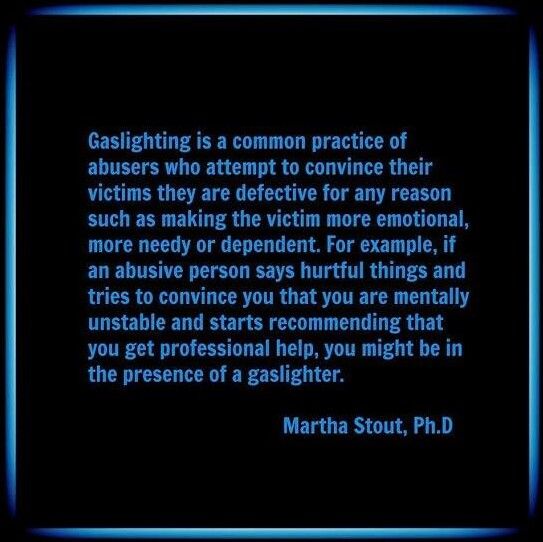
Fifth, the inability to say "no" and defend personal boundaries. If a person is able to fight back and stop disrespectful behavior towards them, they are unlikely to be gaslighted easily.
The last and perhaps the most important point is the experience of violence in early childhood. As practice shows, usually it is he who leads to the formation of all of the above personality traits. nine0005
Alena Golzitskaya, systemic family psychotherapist, Alter psychologist selection service specialist, researcher at the Psychological Institute of the Russian Academy of Education
You can't be born a gaslighter. But you can be born with a predisposition to certain behaviors. Due to the type of nervous system or the physiological characteristics of the body, a person, for example, may be less sensitive to the suffering of others. Abusive behavior is formed when a child observes how a significant adult uses such manipulative techniques when interacting with him or with other people. nine0005
nine0005
Some parents like to say: “You're making it up – it didn't happen”, “I didn't say it and couldn't say it”, “You dreamed it”, “What are you whining about - nothing terrible happened”. If you have heard such phrases addressed to you and at the same time began to doubt your memories or feelings, you have encountered manifestations of gaslighting.
People who engage in abusive behavior rarely think about how it affects others. They seek to derive their own benefit from what is happening. And doubts about whether they behave correctly, as a rule, do not visit them - this is due to the protective mechanisms of their psyche. Therefore, gaslighting is usually noticed by the person to whom it is carried out. nine0005
If you want to save the relationship, try telling your partner that you feel uncomfortable when he does this to you. Focus on your feelings and ask him to pay attention to it. Most likely, the partner will need professional psychotherapeutic help in getting rid of the gaslighting pattern.